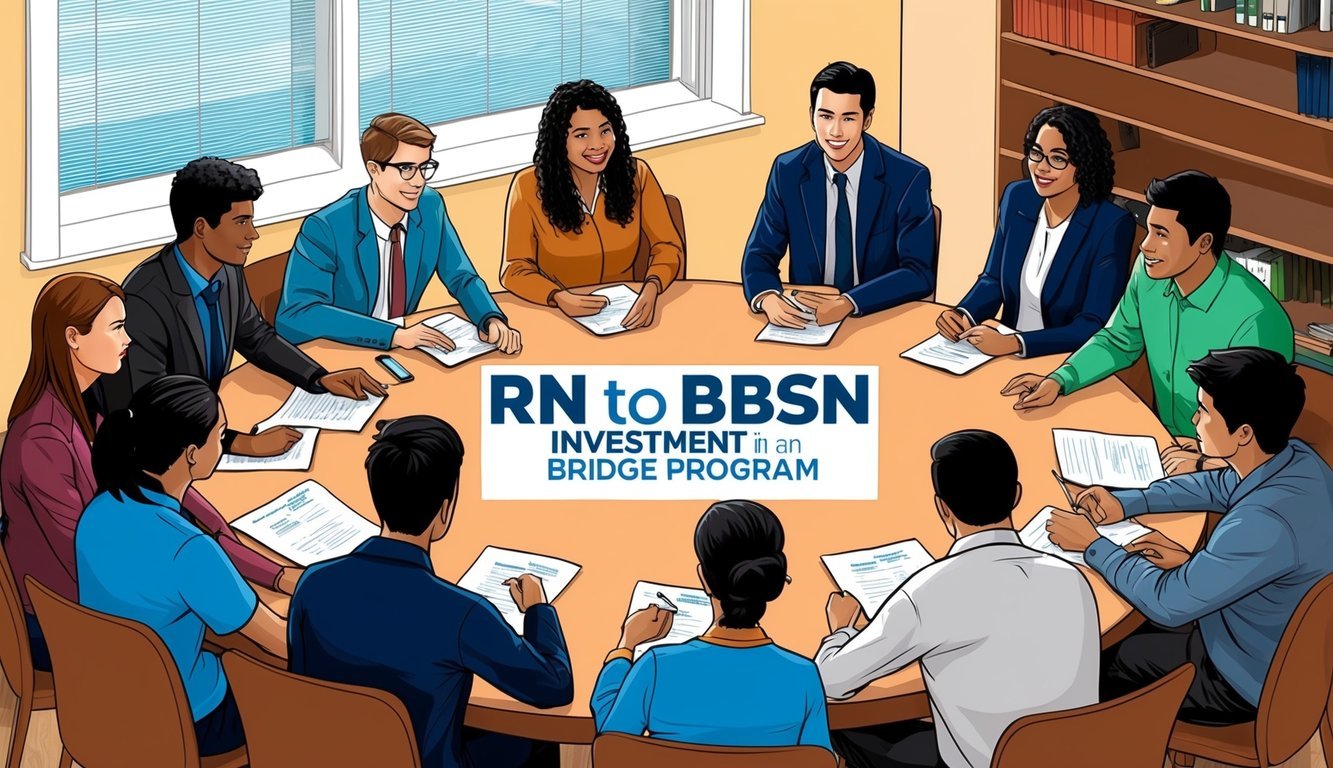The RN to BSN bridge program offers a pathway for registered nurses to enhance their qualifications and expand their career opportunities. Earning a Bachelor of Science in Nursing (BSN) positions you for greater responsibilities and leadership roles within healthcare settings. This program not only builds on your existing skills but also provides the necessary knowledge to navigate the complexities of modern nursing practice.
The growing demand for highly educated nurses means that many healthcare employers now prefer or require a BSN for various positions.
As you progress through an RN to BSN program, you will engage with advanced topics such as community health, nursing research, and health policy.
These subjects prepare you for diverse roles, including management, education, and specialized clinical positions, ultimately making you a more competitive candidate in the job market.
Flexible learning options make it easier for you to balance work and study while you pursue your BSN.
Many institutions offer online classes, allowing you to complete your degree at your own pace.
Whether you aim to work in hospitals, clinics, or public health organizations, enrolling in an RN to BSN bridge program is a strategic move that can significantly enhance your career trajectory.
Understanding RN to BSN Bridge Programs
RN to BSN bridge programs help registered nurses who hold an Associate Degree in Nursing (ADN) transition to a Bachelor of Science in Nursing (BSN).
These programs recognize your existing knowledge and skills, allowing you to advance your education and meet the increasing demands for higher educational qualifications in nursing.
Program Overview
RN to BSN bridge programs provide an accelerated path for nurses to obtain their BSN.
Typically, these programs are tailored for those who already possess an ADN and want to expand their competencies.
You will engage in advanced coursework that covers nursing theory, research, leadership, and specialized topics such as public health.
The program structure may include online classes, in-person labs, and clinical experiences.
Programs can vary significantly in duration, ranging from one year to two years, depending on your course load and prior credits.
Eligibility and Prerequisites
To enroll in an RN to BSN program, you generally need to meet specific eligibility criteria.
Most programs require the following:
- A valid RN license
- An ADN from an accredited institution
- A minimum GPA, often around 2.5 to 3.0, depending on the program
You may also need to submit transcripts, recommendation letters, and a personal statement.
It’s essential to check the specific prerequisites of each program, as they can differ.
Accreditation Standards
Accreditation is crucial for ensuring that the educational program meets established quality standards.
Most RN to BSN programs seek accreditation from organizations such as the Commission on Collegiate Nursing Education (CCNE) and the Accreditation Commission for Education in Nursing (ACEN).
These accreditations confirm that the program adheres to best practices in nursing education.
Graduating from an accredited program can also affect your eligibility for licensure and further education options, making it an important aspect to consider.
Types of Bridge Programs
Several types of RN to BSN bridge programs are available, catering to different needs.
Here are a few common options:
| Program Type | Description |
|---|---|
| Traditional | Typically requires attending classes on campus with a structured schedule. |
| Online | Offers flexibility through online coursework, allowing you to balance work and learning. |
| Hybrid | Combines online courses with in-person labs or clinical experiences. |
| Accelerated | Designed for full-time study, allowing you to complete your BSN in a shorter time frame. |
Choosing the right program type will depend on your lifestyle, responsibilities, and learning preferences.
Conduct thorough research to find the best fit for your educational journey.
Curriculum and Coursework
The curriculum for an RN to BSN bridge program is designed to enhance your nursing knowledge and integrate advanced concepts from various disciplines.
This coursework not only sharpens your clinical skills but also provides a comprehensive understanding of healthcare systems and patient care.
Core Nursing Courses
Core nursing courses build on your foundational knowledge from your associate degree.
Key subjects often include nursing theory, nursing research, and healthcare ethics.
| Course Title | Focus Area |
|---|---|
| Nursing Concepts | Application of nursing theories |
| Evidence-Based Practice | Utilizing research in nursing |
| Health Assessment | Comprehensive patient assessment |
These classes emphasize critical thinking and decision-making, preparing you for advanced practice.
Coursework may also cover standards related to microbiology, anatomy and physiology, and nutrition, integrating science into nursing practice.
Specialized Nursing Topics
In this section, you’ll explore specialized areas of nursing, often tailored to your career interests.
Tutorials might include gerontology, pediatric nursing, or mental health nursing.
Specialized topics encourage deep dives into subjects such as:
- Human Growth and Development: Understanding patient needs across the lifespan.
- Psychology in Nursing: Tools for better patient interaction.
- Cultural Competency: Essential in diverse healthcare settings.
These subjects foster an environment where you can examine real-world challenges in nursing while gaining insight into contemporary issues affecting the healthcare landscape.
General Education Integration
General education courses play a vital role in rounding out your nursing education.
Classes in statistics, arts and humanities, and communication enhance your critical thinking and interpersonal skills.
| Subject Area | Importance |
|---|---|
| Statistics | Necessary for understanding research data |
| Arts and Humanities | Promotes empathy and cultural understanding |
Completion of these courses supports a holistic nursing practice.
You’ll also explore subjects that relate to patient care, ensuring you are well-equipped to communicate effectively in various settings.
A well-rounded education prepares you not just as a caregiver but as a leader in nursing.
For more details about specific curricula, you may refer to helpful resources such as Nurse.org or WGU’s Nursing Program.
Online RN-to-BSN Education
Online RN-to-BSN programs provide flexible options for registered nurses seeking to advance their education and career.
These programs combine the convenience of online courses with the comprehensive curriculum needed to prepare you for leadership roles in nursing.
Advantages of Online Learning
One of the primary advantages of online RN-to-BSN education is flexibility.
You can manage your studies around your work schedule, allowing you to maintain your employment while advancing your degree.
Online programs often feature a variety of formats, including asynchronous courses, which let you learn at your own pace.
This is particularly beneficial for busy professionals who juggle work, family, and education.
Additionally, many programs offer a diverse range of resources such as virtual libraries, online discussion forums, and access to experienced instructors.
These tools enhance your learning experience and provide ongoing support.
Online Program Structure
The structure of online RN-to-BSN programs typically includes core nursing courses, elective subjects, and a capstone project.
Most programs require around 30-40 credit hours that you can usually complete within one to two years, depending on your pace and commitments.
Courses may include topics like community health, nursing leadership, and evidence-based practice.
Many programs also incorporate clinical experiences that you can often complete in your community, ensuring you apply what you learn in real-world settings.
Program requirements may vary, so make sure to review specific details from institutions like WGU or Marshall University for tailored options.
Clinical and Practical Experience

In an RN to BSN bridge program, clinical and practical experience are crucial components that help you apply theoretical knowledge in real-world settings.
This experience enhances your nursing practice and develops essential skills for effective patient care.
Clinical Rotations
Clinical rotations provide the opportunity for hands-on experience in various healthcare settings.
During these rotations, you will engage in direct patient care under the supervision of experienced professionals.
This aspect of learning allows you to apply your health assessment skills, develop critical thinking, and practice cultural competence.
You may rotate through specialties such as community health, pediatrics, or critical care, depending on your program.
Typical requirements often include 200-400 clinical hours.
Participating in diverse clinical settings not only strengthens your nursing practice but also enhances your communication skills, helping you to interact effectively with patients and colleagues.
Simulated Scenarios
Simulated scenarios are designed to bridge the gap between theory and practice.
In these settings, you will encounter realistic clinical situations that require you to think critically and respond effectively.
Simulations may include high-fidelity mannequins or virtual patient encounters, allowing you to practice clinical interventions, emergency response, and patient management strategies.
This environment fosters a safe space where you can make mistakes and learn from them.
These experiences help you refine your nursing skills and boost your confidence while also improving your stress management abilities in high-pressure situations.
Professional Skill Development
Throughout the RN to BSN program, your professional skill development is emphasized.
This includes not only nursing-specific skills but also interpersonal and leadership abilities vital for today’s healthcare environment.
Courses and experiences in areas such as communication skills and teamwork are integrated into your curriculum.
You will be encouraged to participate in group projects, case studies, and community health initiatives, which foster a spirit of collaboration.
Additionally, you will learn about the roles of various nursing specialties, including that of a clinical nurse specialist, positioning you well for advanced practice roles in the future.
Career Enhancement and Opportunities
The RN to BSN bridge program significantly opens doors for career advancement, specialized roles, and higher education opportunities in nursing.
As you progress through this program, you’ll discover numerous ways to enhance your career and impact patient outcomes.
Advancing Nursing Careers
Transitioning from an RN to a BSN equips you with additional skills that are crucial for higher-level roles.
With a BSN, you can pursue positions such as a clinical nurse leader or nurse manager, both of which offer expanded responsibilities in patient care and healthcare management.
A higher degree increases your employability and can lead to a more competitive résumé, showcasing your commitment to professional development.
In many healthcare settings, having a BSN is a requirement for advancement into roles that involve leadership or specialized care.
Specialized Nursing Roles
The RN to BSN program prepares you for specialized fields such as public health nursing, critical care nursing, or healthcare policy.
This program addresses the advanced knowledge needed for these roles, such as nursing ethics and public health principles.
For instance, a public health nurse focuses on community health and preventative care, directly affecting patient outcomes on a larger scale.
Meanwhile, roles like critical care nurse require in-depth expertise in managing complex patient cases, enhancing your critical thinking and clinical skills.
Continuing Education and Degrees
You might consider furthering your education by pursuing a Master of Science in Nursing (MSN) or a Doctor of Nursing Practice (DNP) after completing your BSN.
These advanced degrees open pathways to higher salary brackets and positions in healthcare that influence policy and nursing practices.
Online nursing degree programs offer flexible options for those balancing work and education.
They enable you to advance your studies while maintaining your RN license.
By investing in higher education, you not only enhance your career but also position yourself as a leader in the nursing field, making significant contributions to patient care and healthcare improvement.
Enrollment and Investment

When considering the RN to BSN bridge program, understanding the enrollment process and financial commitments is essential.
This section focuses on the admission requirements, tuition costs, and available financial assistance options.
Admission Process and Requirements
To enroll in an RN to BSN program, you typically need an active RN license and an associate degree in nursing (ADN).
Prerequisite courses may vary by institution, but often include subjects like statistics, microbiology, and health assessment.
You may also need to provide a criminal background check and letters of recommendation from previous educators or employers.
Be prepared to submit transcripts that reflect your nursing education and grades.
Many programs allow for the transfer of credits, which can reduce the time you spend completing your BSN.
It’s important to check with the specific school for their policies and to ensure you meet all prerequisites before applying.
Understanding Tuition and Fees
Tuition costs for RN to BSN programs can differ significantly by institution.
Generally, you can expect to pay between $5,000 to $15,000 for the entire program.
Some schools charge tuition per credit hour, while others may have a flat fee for the duration of the program.
Here’s a simplified breakdown of potential costs:
| Type of Fee | Estimated Cost |
|---|---|
| Tuition | $5,000 – $15,000 |
| Books and Supplies | $500 – $1,200 |
| Technology Fees | $100 – $300 |
Make sure to consider any additional fees related to clinical placements or administration costs that may apply.
Financial Aid and Scholarships
Students enrolling in RN to BSN programs have numerous financial aid options.
You can explore federal and state aid, which often requires the completion of the Free Application for Federal Student Aid (FAFSA).
Scholarships specifically for nursing students are also an option.
Some institutions offer their own scholarships, while external organizations may provide additional funding opportunities.
Key resources for scholarships include:
- Nursing organizations: Check for state or national nursing associations that provide annual scholarships.
- Local community foundations: Often offer scholarships for residents pursuing higher education.
Leveraging these financial resources can significantly alleviate the cost of your education.
This makes it more feasible to invest in your career advancement.

